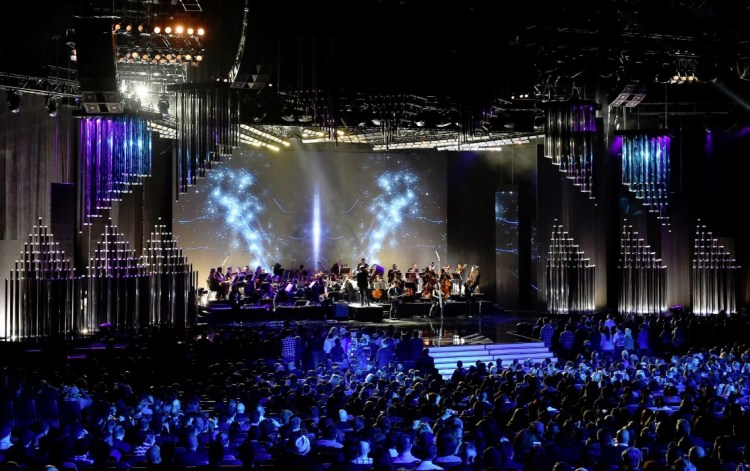If gaming has a gala, it is The Game Awards. Coming December 6, the awards show for the video game industry will be streamed live across 40 global video networks.
Fans will be able to vote on all of the awards on Discord servers, Amazon Alexa, and Google Assistant. Love it or hate it, it’s been called the “Oscars of gaming,” and that very phrasing gets it all wrong, as games have become bigger than movies in terms of blockbuster hits, revenues, and audience size. As Josef Fares said at last year’s The Game Awards, “F*** the Oscars!“, as you can see below.
The man behind the show, which will take place at the Microsoft Theater in downtown Los Angeles, is host Geoff Keighley. Just four years old, the show reached more than 18 million viewers in 2017. I like it because it brings together game developers, Esports champions, digital influencers, and Hollywood names for a night about celebrating games. And it gives us the first glimpse of the next year’s big games.
Nominees will be announced on November 13. I talked to Keighley about this year’s show, which will air from China to Brazil and will cost millions of dollars to produce. I’m hoping it will be a platform for bringing us all together.
Here’s an edited transcript of our interview.
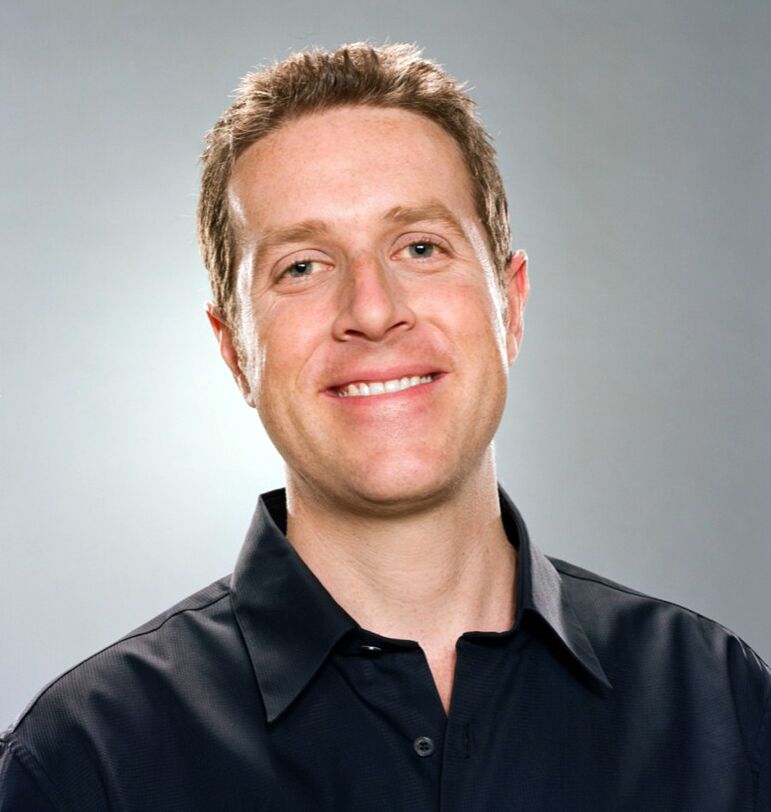
Above: Geoff Keighley is the host of The Game Awards.
GamesBeat: The Game Awards are already very successful. What are you doing this year to make it bigger than last year?
Geoff Keighley: Last year it was a massive success. We were very happy with the results. But it was also very daunting, because we grew so much last year. We more than doubled the audience. Doing that year after year is going to be very difficult. This year we focused on how we could expand in more places. We’re doing a lot in China this year. Stephen Ma from Tencent joined [as an adviser]. We’re going to be live on more than 15 platforms over there. More global distribution in China, Taiwan, Brazil. Generally we’re increasing our global distribution around the show.
We’re also finding new ways to let fans vote and be part of the show. We added fan voting last year to help fans select the winners. That was very successful. We’re adding voting via Alexa. You can vote with your voice. We’re partnering with Discord to have live voting on Discord servers. More places to watch the show and more ways to be part of the show and interact. Beyond that, with Fortnite and all these other titles that are getting so much attention — the show gets stronger because games get stronger.
GamesBeat: Do you see yourselves doing some things that are very different from traditional award shows?
Keighley: Our show is unique. “Awards” is in the name, and at the end of the day that’s why we do the show, but the forward-looking content, the new game announcements, that’s a big part of what drives people to the show. It’s always a balance between awards and first looks. This year we probably have our biggest lineup ever in terms of new game announcements at the show. Most of the major publishers will be sharing news on what they’re doing in the future.
It’s a big event for the industry. I’m really proud that we have so many companies on the same stage, putting competition aside to share a first look at where games are going in 2019 and beyond. That’s something a lot of awards shows don’t do. We think the urgency and excitement around that drives a lot of viewers.
https://www.youtube.com/watch?v=g2sV3fDbYvQ
GamesBeat: Do we all agree with Josef Fares we should just say, f*** the Oscars, this isn’t the Oscars?
Keighley: [Laughs] A lot of people asked me what I thought about his rant. What I say about that is, he wasn’t attacking our show. He was attacking, as you said, the suggestion that we have to be validated by other forms of entertainment. That’s something I constantly think about, because I love that sometimes we can bring pop culture together on our show. We can have Guillermo del Toro at our show, which elevates all these media. It shows that film people respect games and game people respect film.
But yeah, the idea that our show is questing to become the Oscars — we’re a very different show. The Oscars has its own struggles with the way the Academy is set up. You probably saw the news that they’re trying to add a “popular” Oscar category. They announced that and pulled back. They’re trying to figure out how to relate to the audience. We found a different model for the Game Awards.
The tagline of “the Oscars for the game world,” that’s just a shorthand to help explain that this is a ceremony that matters for games. But when you actually look into it, it’s very different. Our awards are selected by a jury of media and fans. It’s a blended vote, which is a very unique process. That’s what we’ve found works best for this industry, to have gamers and publications vote on it. The Oscars, once you’re in the Academy you’re in for life. We have a revolving group of people, or outlets really, that have collective opinions. It’s a very different model. Having done these shows for a long time, we’ve found that’s what works for games.
Again, the forward-looking aspect of this industry — people like to be marketed to. They like to hear about where games are going in the future. It’s like E3. That’s one big marketing event, but gamers love it, because that gets them excited about what’s coming up in the future. The other thing this year is that the jury is very global. We have more international outlets involved. We have outlets from China and Peru and Australia and Japan, everywhere around the world. That’s one of the big selling points of the show, that it really is global in how it looks at the industry. That’s powerful and exciting for me.
Our show is unique. Its signature is what works for the game industry. A lot of people have tried to understand why this show works and why other award shows keep losing ratings. It’s very different. We’re all digital. We’re interactive. We have a very different approach to how we distribute the show. It’s been working for us. We’re not questing to take down the Oscars or anything like that. The film industry is incredible, and it’s inspired a lot of people in the game industry. We’re just creating a show that works for our audience and honors the people that create these games and devote their lives to them. That’s why we do the show.
GamesBeat: Is Content Creator of the Year — is that a different name for what you’ve had before as Trending Gamer?
Keighley: Yeah. We’ve sort of evolved that category. What’s happened in the past, we’ve had this category which is a blend of streamers and personalities and people who’ve done good in the community. The thing we’ve found, especially if you involve fan voting, is that it’s not necessarily fair to have these massive streamers that have huge built-up audience along with folks who really do deserve to be recognized for what they’re doing.
We’ve split the category in two halves, in effect. We’re partnering with Facebook on this program called Global Gaming Citizens. That’s recognizing people throughout the world, throughout the community, that are doing great work. They’re being active in their community. They’re evangelizing gaming. They’re doing great things. We’ll talk more about that as we get closer to the show, but we’re going to honor a bunch of people that way. Multiple people, not just one.
The Content Creator of the Year, that’s really going to be looking at creators in the community that are espousing the positive benefits of gaming, that are doing great things for the community. Obviously there are a lot of incredible creators on Facebook and Twitch and YouTube and Twitter and all these other platforms that communicate to the gaming audience. It’s important to recognize the players in the show.
That’s something, again, that’s unique compared to the Oscars. They’re not going to give an award to the moviegoer of the year. But we feel that gaming is an inherently interactive medium. The player is partly the author of the experience. Having an award that recognizes an individual from the community is important. We’re evolving that category and recognizing people that do good in the community exclusively, and then also look at these creators who’ve had the most impact on the industry this year. We don’t know the nominees yet, but we know that a lot of streamers have crossed over in popular culture in a big way this year.
GamesBeat: That’s also separated from this Games for Impact award, which is more about developers?
Keighley: That’s right. We’re very proud of the Games for Impact award, which recognizes developers who make games that have social meanings and messages. That’s part of looking at the industry and this award show and making sure that we represent the industry in the right way to the broader community. We have an obligation now, because so many people watch the show—we should absolutely celebrate the biggest games of the year and the most commercially successful games, the most critically acclaimed, but a lot of other work deserves to be recognized and discovered.
A lot of people come up to me and say, “The Games for Impact nominees, I didn’t even know these games existed. Then I went and found them on Steam and that was really interesting.” We do a lot of work to discover those games. A nomination in that category can make a massive difference for those creators. Some of the moments we’ve had a few years — like That Dragon, Cancer a few years ago, when that received the award — we had a very moving speech from Ryan Green talking about that game. That’s the kind of thing I’m proud of. Winning an award, for some of these big games — God of War, Red Dead, Fortnite — I mean, they’re all doing great already. But something like the Games for Impact award can make a huge difference.

Above: The Game Awards
GamesBeat: It seems like your big moments usually have something to do with Hideo Kojima.
Keighley: Ah … yeah. He’s always there in some form. But we haven’t said anything about the world premiere part of the show. One thing that’s important to me is that when we first start talking about the show, we focus on the awards. People always ask me on social media about what’s going to be announced, what’s going to get shown. I think we have a good enough history of debuting new games and announcements that people can expect that. But as far as specific content that’s going to be at the show, we’re not talking about that yet. As we get close to show we’ll share some things, although honestly we won’t talk about what are in effect surprises for the show.
But yeah, Kojima has been a great friend of the show over the years. We’ve shown, I think, two or three years of Death Stranding stuff. We have amazing developers across the industry now that support us. This year there was quite a runoff, with a lot of games that wanted slots to be part of the show and share new content. Another thing you’ll see this year — yes, we have new game announcements, but we also have a lot of ongoing games. People keep playing games as services, and they’ll have updates around new content and features that may get revealed at the show. Maybe it’s not a new game announcement, but it’s something that will matter to a massive player base around the world. That’s new and evolving.
Last year, with PUBG, we announced Miramar, their second map. We revealed that at the show. That was a big moment. I think you’ll see more of that kind of thing with a lot of different games this year.
GamesBeat: What’s the behind-the-scenes story like, as far as what it takes to put on the awards? How many people get involved?
Keighley: The Game Awards end up taking about half my year to do. I focus on E3 up through the summer, take a break for a couple of weeks, and then go right into the Game Awards. Sometimes I’ll meet folks in early fall and they say, “Oh, you’ve gotta start working on the Game Awards soon.” It really is a year-round process. I’m traveling to visit pretty much every game publisher in the world — Asia, Europe, America. In the summer we’re meeting people and talking about what they want to see in the show, starting to build the program from there.
We have a core team of four or five people that work on the show for the better part of half the year. The team eventually scales up into the hundreds when you add all the technical and camera people and everything that get involved in the show. It takes a lot of people to get together on site and put together a multi-million-dollar award show. But the core team is really a group of people that are really passionate about doing what we’re doing. It’s still an independent entity. We keep it small and tight. We focus on the games we want to show and the way we want to show them.
For me, I’m very passionate about the opportunity I have to build this show. I give it my all to focus on every little moment, trying to engineer it in a way that will represent our industry properly. We won’t always get there, because so many factors play into this. But generally, across a two-hour award show, we think a lot about the right content, the right sponsors to involve, all of these things. Some years there will be things like, famously, the Schick Hydro razor that people take exception to, and we get it.
I think we’re evolving now. We’re trying to get better. We have better sponsors wanting to get involved in the show and add value. It’s just something that evolves over time. I’ve learned that you have to be patient, year after year, to get the audience to believe in the longer-term vision of where it’s going to go. I’m trying to build something that stands the test of time. It’s not just about doing it right this year. It’s about how, in 10 or 15 years, we can still make this a ceremony that gamers are proud to be a part of.
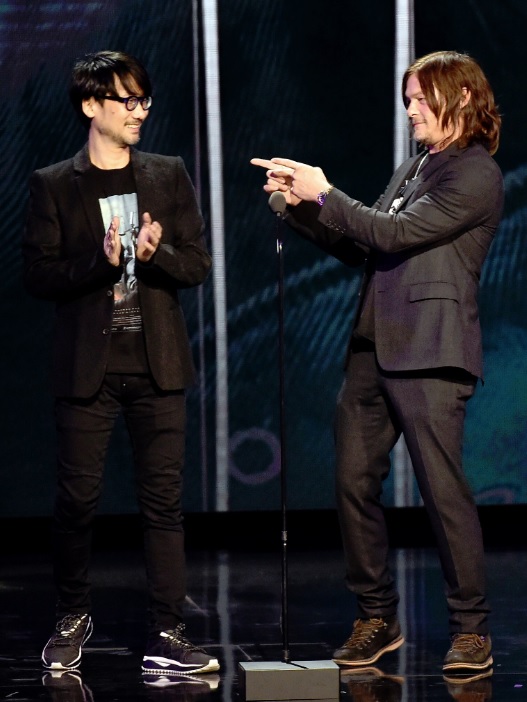
Above: Hideo Kojima and Norman Reedus at The Game Awards.
GamesBeat: Do you have a general budget figure, something to give us a sense of the scale?
Keighley: I probably shouldn’t say anything specific, but it’s in the millions of dollars as far as cost to mount the show every year.
GamesBeat: What’s the venue this year?
Keighley: The Microsoft Theater. For us it’s very important that we do it at the scale of other major industries. That’s where the Emmys are done every year. It’s important for us to do something on the scale of other entertainment media, because gaming is the largest form of entertainment in the world. Our award show should be just as big as anything else out there.
It’s not just about the size of the venue. It’s also the scale of the production. Most of the people that work on our show are folks that work on other major award shows, concert tours, things like that. Our set designer, LeRoy Bennett, does Paul McCartney’s tour. He does The Weeknd’s tour, and Lady Gaga. We work with some of the best people in the entertainment business to bring our show to life.
GamesBeat: You’re going to have lots of entertainers again, I take it?
Keighley: That stuff is always harder to know before we get closer to the show, but yes. We like to have entertainers, boldface names, when they really want to be there because they love games and love this industry and respect it. That’s what I’m proud of. Anybody who walks out on that stage wants to be there because they love video games. Whether it’s Zachary Levi or Guillermo del Toro or Andy Serkis or Norman Reedus, these are all folks that respect gaming and are involved in the industry, or want to be a part of it in some way.
I’m very happy having lots of great game developers out there now. I think there’s also the possibility to have a lot of content creators presenting, and other game creators. The neat thing about our show is that it’s an eclectic mix of all these things coming together. I’m proud of that. Just like what we do at E3 Coliseum, where we can have the creators of Westworld and then Todd Howard and all these interesting folks in the mix there, we have a similar thing with the Game Awards.
Yes, there are talent names tied to the show. But we’re not wedded to that. Our ratings are not really driven by that either. Gamers are tuning in to see games. If there are also some cool people from popular culture there that add to the evening and the stature of it, amazing. But it’s different from a TV awards show where we have to announce the cast of the hottest new series of the fall being there to drive awareness. That’s not how we think about things.
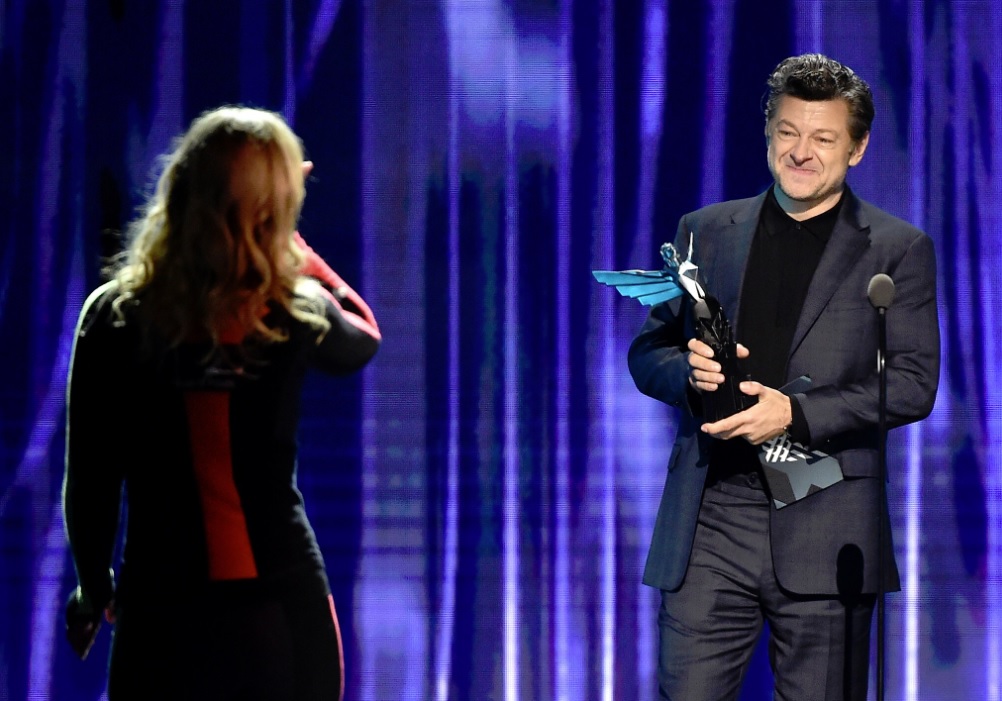
Above: Andy Serkis at The Game Awards.
GamesBeat: What do you think about the edges of the industry now, the places where it’s expanding? We have mobile games, AR and VR, esports, blockchain technology. Does any of this seem like it’s going to become relevant to your core audience?
Keighley: We think a lot about that. There are more opportunities, especially in the mobile game space. We’re seeing a lot of mid-core games with incredible graphics and incredible content, with more appeal to our audience. Mobile is something we’ve looked at increasingly, how we can debut things. We’ve looked at games like thatgamecompany’s new title Sky. You look at a game like that, you don’t even know if it’s running on a console or PC or phone. It’s so beautiful. Artistically, there’s a lot of interesting stuff happening in the mobile space that we think will continue to cross over into our world.
AR and VR, there’s opportunity there for sure, to cover that content. The challenge for us is that it’s still a limited audience that gets to see and play it. I don’t think we’re at a point yet where a VR game could be up for Game of the Year. But the fact that there are more games coming into the market on more platforms is good for everyone. Free-to-play games grow the pie. Everyone who’s coming in to play Fortnite this year — yes, there are some core gamers there, but I know anecdotally that a lot of people who don’t traditionally play games are playing Fortnite. I would selfishly hope that some percentage of those people might be keen to watch something like the Game Awards and learn more about the industry and get excited about where games are going.
That’s been one of the biggest revolutions: lowering the barrier to entry. One of the things about the Game Awards, when I conceived it back in 2013 — I really wanted it to have no barrier to entry. It was free on every device and every platform. You didn’t have to have a subscription. You didn’t have to log in and authenticate an account. You could do whatever you wanted to do to get access to it. In many ways the show is designed like these free-to-play games, where you can access them however you want.
GamesBeat: Do you think it’s going to be Red Dead Redemption 2’s year?
Keighley: I don’t know. It’s been a great year. Obviously when you look at Metacritic and things like that, Red Dead is going to be a contender this year. But it’s been a great year. God of War is incredible. Spider-Man. There are smaller games. Dead Cells is really cool. Assassin’s Creed.
The thing I’m most curious about is this transition that we’re starting to see from traditional packaged products to online service games. Fortnite officially came out last year, but it really crossed over this year in a much bigger way, and it continues to go. How does that factor into the conversation about Game of the Year? You could argue that on some levels, it’s by far the most talked-about thing in gaming so far this year. But on the other hand, it launched last year.
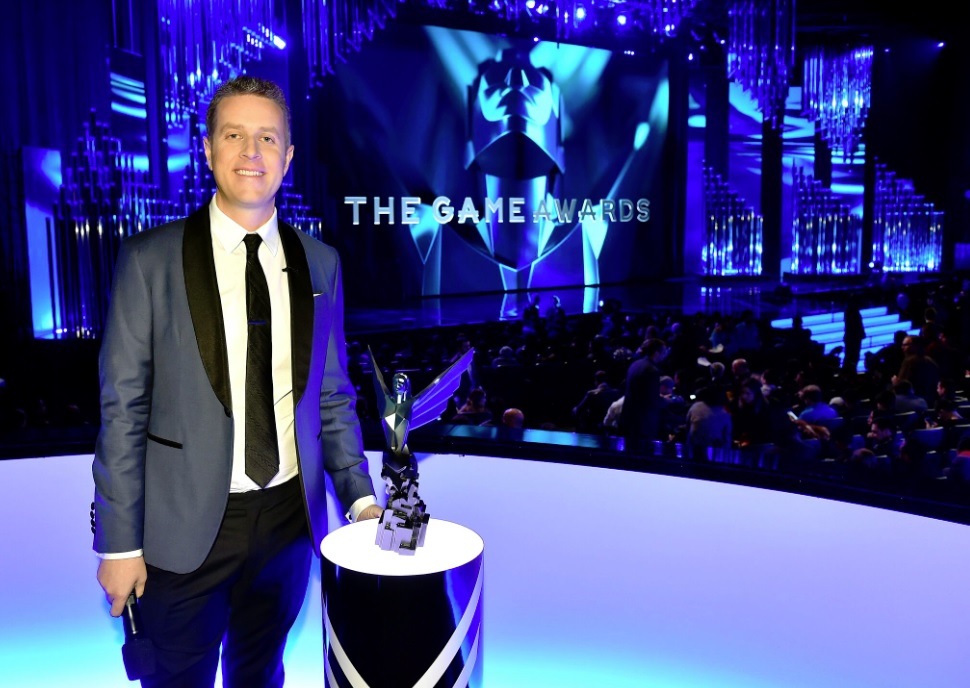
Above: Geoff Keighley stands with the statue for The Game Awards.
You’ve seen this with the notes we send out to the voting publications. The balance between the new shiny game versus the game that’s been out for a period of time — Grand Theft Auto Online, same thing. It’s had a massive impact. There’s tons of interesting creative and technical work being done with these online games. The teams are working really hard on that.
I wonder, over time, if the industry and the Game Awards will become more like the Emmys where seasons or episodes of TV shows get nominated. Game of Thrones, every season it gets nominated. Fortnite even uses the term “season” now. Will we have seasons of games? How does that square up with the traditional story-driven games? We have a category, Best Ongoing Game, which directly addresses that. We think these games deserve to be recognized. But that interplay between Game of the Year and Best Ongoing Game is going to be interesting as it evolves over the next few years.
Some people have said we might not even need Best Ongoing game in the future, because everything is going to be ongoing. I don’t know. But I think about that balance between single-player story-driven games, which tend to be seen as artistic and beautiful and grand, versus multiplayer games, which are appreciated and spectacular and fun experiences, but sometimes it’s easier to forget the amazing work that goes into multiplayer in general.
That came up a few years ago when Overwatch won Game of the Year. I thought that was bold, because here was a multiplayer-only game winning Game of the Year. That was different, because our show traditionally has been Dragon Age, Witcher, these big epic story-based games — those tend to win the big award. Zelda last year. It was cool when Overwatch won a few years ago. That’s just a natural evolution of the industry. I really like that our show, hopefully, can continue to take the pulse of what really matters in gaming.
It’s difficult, because there are many different groups of people that play different games. But the good news is it’s been an incredible year for games. Last year was amazing. Nintendo had a new Mario and a new Zelda. This year, although Smash will come out the night of the show, Nintendo hasn’t had as much new content this year. But there’s Red Dead, and so many others. It’s been incredible.
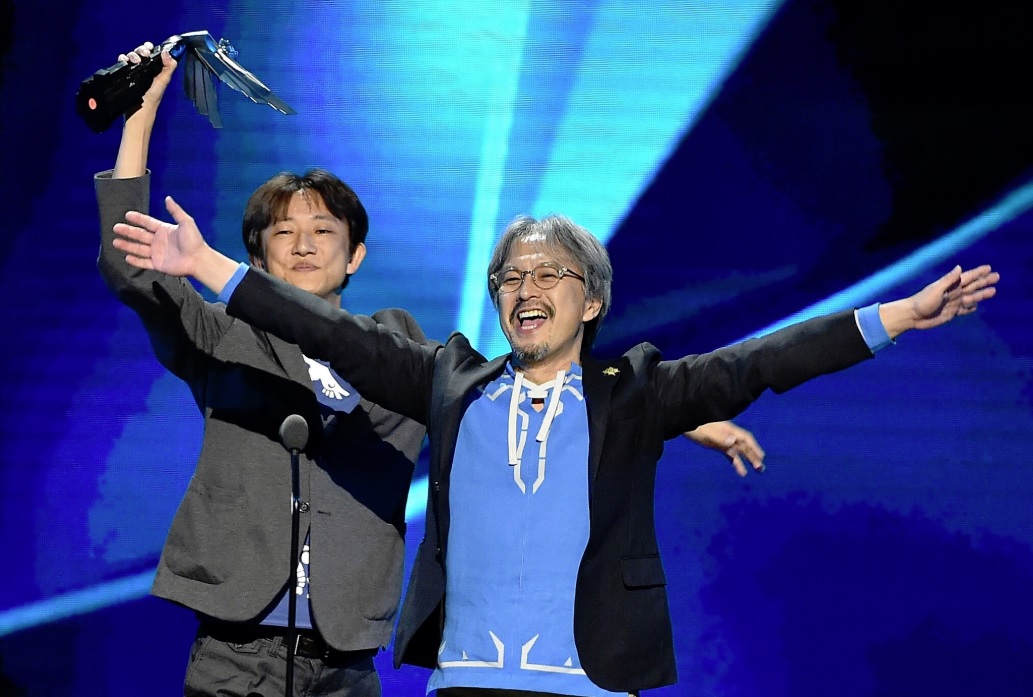
Above: Zelda co-creator Eiji Aonuma (right) celebrates victory at 2017’s The Game Awards.
GamesBeat: The Smash camp must not be happy with that cutoff date. Same with Battlefield.
Keighley: I said to Reggie, you stole my date to launch your game. [Laughs] Battlefield is technically eligible, though, because EA has that weird early access thing. Even though it comes out November 20, it comes out November 10 if you’re an Origin premiere subscriber. Battlefield is technically eligible. Our cycle for the show is basically U.S. Thanksgiving to U.S. Thanksgiving as far as timing. We don’t call it the Game Awards 2018 anymore. It’s just the Game Awards. Traditionally, any December release is eligible the next year.
The Grammys are the same way. I think eligibility for the Grammys cuts off in October or something like that. We just don’t use a traditional calendar system. We do that to protect the integrity of the awards, because we don’t want people voting on games that aren’t released yet. Smash will be eligible next year, and I’m sure it will be well-played and well-talked-about all year.
GamesBeat: Anything else you wanted to mention?
Keighley: We’re bringing back the orchestra this year, which we’re really excited about. That got a great response last year. Video game music will be played live with the Game Awards orchestra, which we’re excited to have again.
We’re looking to just keep evolving the show. We’re trying some new things this year with the Global Gaming Citizen program. Our student game program is back again. My whole philosophy with the show is that we need to evolve constantly. I feel like a lot of award shows get very regimented in the format and the tradition of how they do things. It’s hard to change anything. With Game Awards, I’m on the forums. I’m constantly listening on Twitter. We take in all the feedback and we’re trying to evolve the model.
People didn’t like the Schick Hydro razor. We take that feedback in and we think about. Schick actually came back to us too and said, “We have to change how we approach this audience.” We’re constantly learning. But I think we have the core of something great now. Every year is completely different, but I’m excited this year. The games are amazing. We have incredible announcements and first looks for the show. It’s going to be a fun time.
